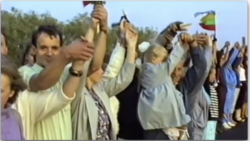For some Latvian teenagers, it ranks as the world’s first flash mob -- a marvel in the pre-Internet era. For others, including democracy activists in Hong Kong, it set the standard for how to organize an effective, non-violent demonstration.
Thirty years ago, on August 23, 1989, approximately 2 million people in Estonia, Latvia, and Lithuania joined hands to form a human chain more than 600 kilometers long to show their desire for independence from the Soviet Union.
Nothing like this human protest chain, generally known as the Baltic Way, had ever occurred before in the Soviet Union or Europe. Current Time spoke with some of the participants and organizers of the Baltic Way to find out how they remember this event today.
Ultimately, the chain's participants got their wish: Within a year, all three countries had regained the independence they had lost in 1940, when Soviet forces, acting on a secret protocol to the USSR’s Molotov-Ribbentrop Pact with Nazi Germany, annexed their territory.
But the 1989 protest against this annexation does not always translate within the Baltic states' largest neighbor, Russia.
Russian mainstream media appears to have largely sidestepped mention of the Baltic Way anniversary, which coincides with the 80th anniversary of the signing of the Molotov-Ribbentrop Pact. To mark the date, Moscow has embarked on a campaign to present that agreement as justifiable amidst the uncertainties of the late 1930s.
On August 14, the state-run Channel One, for instance, reasoned that the deal gave the USSR “a two-year head start to prepare for Germany’s [1941] attack” and broadened the buffer zone between the Soviet border and the population centers of Leningrad, Odesa, and Minsk.
The English-language, government-controlled Sputnik outlet has followed up with an analysis that asserts that Western attempts to "demonize" the agreement stem from European leaders' own failure to band against Nazi Germany and stop the rise of Adolf Hitler in the 1930s.
Such reasoning, though, is unlikely to find a supporter in Sergei Metlev, spokesperson for the Estonian Institute of Historic Memory. “Without a clear agreement between [Soviet leader Josef] Stalin and Hitler,” he commented to Current Time’s Footage Vs. Footage, “it would not have been so easy to start World War II.”






Facebook Forum